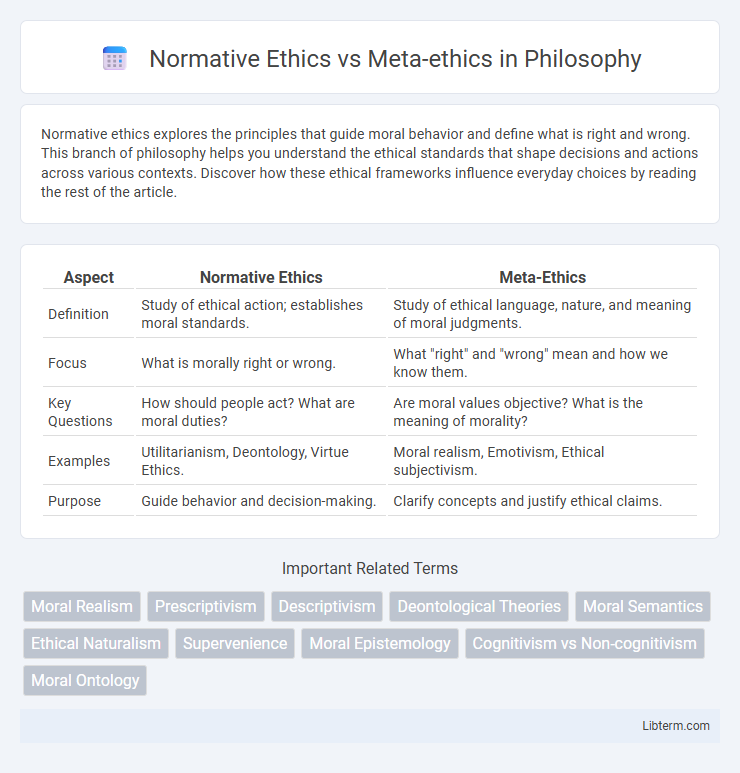Normative ethics explores the principles that guide moral behavior and define what is right and wrong. This branch of philosophy helps you understand the ethical standards that shape decisions and actions across various contexts. Discover how these ethical frameworks influence everyday choices by reading the rest of the article.
Table of Comparison
| Aspect | Normative Ethics | Meta-Ethics |
|---|---|---|
| Definition | Study of ethical action; establishes moral standards. | Study of ethical language, nature, and meaning of moral judgments. |
| Focus | What is morally right or wrong. | What "right" and "wrong" mean and how we know them. |
| Key Questions | How should people act? What are moral duties? | Are moral values objective? What is the meaning of morality? |
| Examples | Utilitarianism, Deontology, Virtue Ethics. | Moral realism, Emotivism, Ethical subjectivism. |
| Purpose | Guide behavior and decision-making. | Clarify concepts and justify ethical claims. |
Introduction to Normative Ethics and Meta-ethics
Normative ethics establishes moral standards that guide human behavior by defining what is right and wrong, often through frameworks like utilitarianism, deontology, and virtue ethics. Meta-ethics examines the nature, origin, and meaning of ethical concepts, focusing on questions about moral truth, objectivity, and the language of morality rather than prescribing specific actions. Understanding the distinction between normative ethics' prescriptive approach and meta-ethics' analytical approach is essential for comprehensive philosophical inquiry in moral theory.
Defining Normative Ethics
Normative ethics establishes the criteria and principles for determining what actions are morally right or wrong, guiding ethical decision-making based on values, duties, and virtues. It contrasts with meta-ethics, which analyzes the nature, meaning, and foundations of moral concepts without prescribing specific actions. The study of normative ethics involves theories like consequentialism, deontology, and virtue ethics, each providing frameworks to evaluate moral behavior.
Defining Meta-ethics
Meta-ethics explores the nature, origin, and meaning of ethical concepts, analyzing what morality itself entails beyond specific moral judgments. It investigates the semantic, metaphysical, and epistemological foundations of ethical terms like "good," "right," and "obligation," contrasting with normative ethics that prescribes moral standards and principles. Understanding meta-ethics involves examining how moral beliefs can be justified, the objectivity of ethical claims, and whether moral values are subjective or universal.
Key Questions in Normative Ethics
Normative ethics addresses key questions such as what constitutes morally right actions, the criteria for ethical behavior, and how individuals ought to act in various situations. It explores principles like utilitarianism, deontology, and virtue ethics to determine standards for evaluating conduct. By contrast, meta-ethics investigates the nature, meaning, and justification of moral concepts rather than prescribing specific moral actions.
Core Issues in Meta-ethics
Meta-ethics examines the foundational nature of ethical properties, statements, and judgments, focusing on issues such as moral realism vs. anti-realism, the meaning of moral terms, and the objectivity of ethical values. It addresses whether moral truths exist independently of human beliefs and how ethical assertions can be known or justified. Core issues include the semantics of moral language, the ontology of moral facts, and the epistemology of moral knowledge.
Major Theories in Normative Ethics
Major theories in normative ethics include utilitarianism, deontology, and virtue ethics, each offering distinct frameworks for assessing moral actions. Utilitarianism evaluates actions based on the greatest happiness principle, while deontology emphasizes duty and adherence to moral rules. Virtue ethics centers on the development of moral character and virtues rather than specific actions, contrasting with meta-ethics, which explores the nature, meaning, and foundations of ethical concepts rather than prescribing moral norms.
Prominent Approaches in Meta-ethics
Prominent approaches in meta-ethics include moral realism, which asserts that ethical statements correspond to objective facts, and moral anti-realism, which denies the existence of objective moral facts. Emotivism interprets moral language as expressions of emotional attitudes rather than factual claims, while prescriptivism views moral statements as universal prescriptions or commands. These approaches analyze the nature, origin, and meaning of ethical concepts, contrasting with normative ethics that prescribes moral standards and principles.
Differences Between Normative Ethics and Meta-ethics
Normative ethics establishes specific moral standards and principles to guide human behavior, evaluating what actions are right or wrong, good or bad. Meta-ethics, in contrast, analyzes the nature, origin, and meaning of ethical concepts, questioning what morality itself signifies rather than prescribing moral judgments. While normative ethics prescribes actionable norms, meta-ethics focuses on the theoretical foundation and language of moral reasoning.
Practical Implications in Moral Philosophy
Normative ethics provides actionable guidelines and principles to determine what is morally right or wrong, directly influencing ethical decision-making in real-world scenarios such as medical ethics, business conduct, and law. Meta-ethics, by contrast, analyzes the nature, origin, and meaning of moral concepts without prescribing specific behaviors, shaping frameworks for understanding linguistic and conceptual moral issues. Practical implications arise as normative ethics guides concrete choices, whereas meta-ethics informs the interpretation and justification of those moral standards.
Conclusion: The Relationship Between Normative Ethics and Meta-ethics
Normative ethics provides practical guidelines and principles that shape moral behavior, while meta-ethics explores the underlying nature, meaning, and justification of those moral concepts. The relationship between normative ethics and meta-ethics is fundamentally interdependent; meta-ethical analysis clarifies the foundations and coherence of normative ethical theories. Understanding meta-ethical perspectives enhances the development and application of normative ethical frameworks by refining moral language and concepts.
Normative Ethics Infographic

 libterm.com
libterm.com